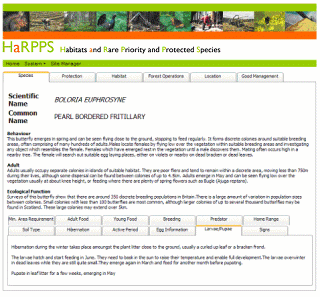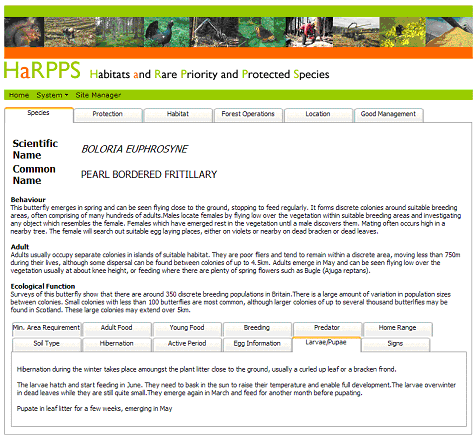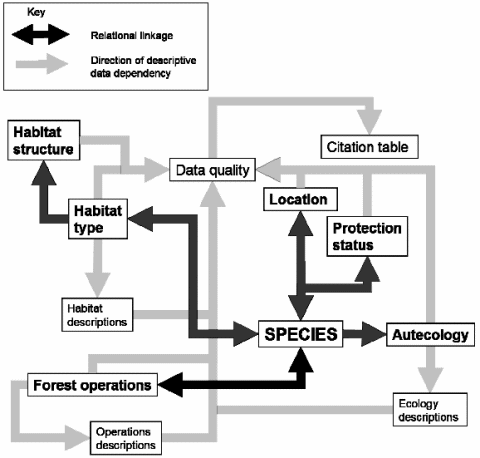Summary
Summary
 HaRPPS is a combined information retrieval system and decision support tool to provide information and guidance for managing habitats and rare, priority, and protected species of forests and woodlands in Britain. It is a web-based application, that will be accessible for use by forest managers and the public, through a registration procedure.
HaRPPS is a combined information retrieval system and decision support tool to provide information and guidance for managing habitats and rare, priority, and protected species of forests and woodlands in Britain. It is a web-based application, that will be accessible for use by forest managers and the public, through a registration procedure.
Information about 131 woodland species has been assembled, including:
- Mammals (22)
- Birds (37)
- Herptiles (5)
- Invertebrates (29)
- Vascular plants (15)
- Lower plants (23)
The web application allows users to run several types of query:
- Species autecological information, including – habitat preference, range, dispersal, food etc.
- Which species are likely to be in a given location and habitat type
- Impact of different types of forest operation (positive and negative) on species in a given location and woodland habitat
- Species likely to be present in a particular locality and which may colonise a new or restored woodland type in a given location.
The system is currently being developed to assess the impacts of forest operations on species and habitat disturbance, and to assess opportunities for habitat improvement.
The need for HaRPPS
For sustainable forest management
The Forestry Commission is committed to delivering sustainable forest management. This requires forests to be managed in a way that does not damage resources now or in the future. This applies to all forests and woodlands managed by the Forestry Commission and to private woodlands managed with the support of public funds through woodland grants.
For nature conservation and public benefit
An estimated 500 million visits are made annually to UK woodlands. Both visitors and the wider population believe that forests provide an important public benefit in providing habitat for plants and animals. The nature conservation function of forests, including the sensitive management of forests for biodiversity, and the management of rare species and habitats, is therefore of major social consequence. HaRPPS is a tool for managers to improve rare and threatened species management, to help deliver this important social benefit.
To reduce disturbance
Recent amendments to UK legislation have emphasised the need to reduce the impact and disturbance of land management operations on rare and protected species and their habitats. Indeed, for certain species, failure to comply may result in prosecution and heavy fines. Consequently there is an urgent need for easily accessible information on the management procedures which reduce the risk of damage and disturbance to species and habitats and which promote management to improve key woodland habitats.
Funders and partners
![]()
HaRPPS was identified as a key system for the delivery of information about forest biodiversity in Britain. The development of the system is funded as part of the Forestry Commission’s Decision Support Systems for Forest Ecology programme.
Status and review
The project was started in 2004. A prototype system was developed and tested in 2005 and the first beta version of HaRPPS was deployed 2008, followed by HaRPPS v2.0.3 in 2010.
Publications
Ray, D., Broome, A., Brunt, A., Brown, T., Mason, A. & Vials, C. (2007). An information system to support sustainable management of Habitats and Rare Priority and Protected Species (HaRPPS) in British forests. In Sustainable Forestry in Theory and Practice (ed K.M. Reynolds). USDA Forest Service, Corvallis, US. ISBN 978-0-9789478-0-4, Edinburgh, Scotland, UK.
Ray, D. & Broome, A.C. (2007). An information retrieval system to support management of Habitats and Rare Priority and Protected Species(HaRPPS) in Britain. In Sustainable Forestry: from Monitoring and Modelling to Knowledge Management and Policy Science (eds K. Reynolds, A. Thomson, M. Köhl, M. Shannon, D. Ray & K. Rennolls). CAB International, Wallingford, UK.
Contact
If you would like more information about HaRPPS, or wish to try and test the prototype then please contact:
Habitats and Rare Priority and Protected Species (HaRPPS) Beta version
Availability
HaRPPS Beta Version 1.0 was released in March 2008, and was quickly followed by release 1.1 in August 2008. Beta Version 2 was released in April 2010, with the current version being HaRPPS v2.0.3.
Limitations
Currently 126 rare, Priority, and protected species associated with woodland or forest habitat are included in HaRPPS. The system is currently in a peer review phase in which the content of the database is being checked for scientific accuracy.
Parts of the interface are still under development, and information about the development history and current work is available within the application.
Using the system
The HaRPPS system will provide up-to-date information about rare, Priority and protected species of woodland habitats for forest and woodland managers.
If you have any comments about the system then please email Duncan Ray
The screenshot below shows an example of the type of autecological information held for the pearl-bordered fritillary (Boloria euphrosyne L.):

Habitats and Rare Priority Protected Species (HaRPPS) data quality
Linkages between the species attributes in the HaRPPS database have been formed from a review of the literature, as well as from researching the experiences and expert opinions of practitioners within forest management.
The information flow model shows how the data quality value and a citation table operate as core features within the HaRPPS database. Every piece of information stored in the system has a citation and data quality value. HaRPPS therefore offers the transparency required when mixing evidence and experience-based information presented to a user or reviewer of the information.
The data quality table (below) provides a means of classifying the type and quality of information used in the database. Information is tagged in the review process to identify the source and its quality:
| Quality class | Description |
|---|---|
| 5 | Peer reviewed papers and books |
| 4 | Websites (known quality review process) and expert knowledge |
| 3 | Unpublished internal reports |
| 2 | Websites (unknown review process) |
| 1 | Anecdotal experience |
Information gained from the results of scientific research published in peer reviewed papers and books is given a classification 5.
Information may also be derived from un-replicated trials (3) and observations from rangers and managers (1), allowing its reliability and hence some of the uncertainty associated with the information to be considered.
Habitats and Rare Priority Protected Species (HaRPPS) species
The species listed below require special attention in the management of Britain’s forest and woodland.
Species are either rare, protected, or occur on the Biodiversity Action Plan priority list. In other words the species are all subject to special protection through legislation or policy.
| Mammals (22) | Birds (37) | Herptiles (5) | Invertebrates (29) | Vascular plants (15) | Lower plants (23) |
|---|---|---|---|---|---|
|
|
|
|
|
|
Habitats and Rare Priority Protected Species (HaRPPS) technical information
Design
The system has several components, which allow easy linkage from internal (HaRPPS) and external sources (other web applications). The information flow model (below) is a schematic representation of the relationships between data tables within the database, and is a useful way of demonstrating the information linkages and data dependencies. It also provides a schematic overview of the kind of data queries that can be constructed.
System architecture
HaRPPS has been developed as a web application to provide open access with exposed web services, to allow interoperability and rapid linkage by third party systems. The HaRPPS application has five main elements:
- Two database components
- A database interface
- Various business logic components
- A presentation layer.
If you wish to discuss links between your own web application and HaRPPS please contact the project lead.
Information flow model
Linkages between species and associated factors
The figure below shows the linkages between:
- Habitat type
- Forest operations
- Autecology
- Location
- Protection status (holding information about legislation, regulation and policy).

Each factor contains several attribute tables. For example invertebrate autecology contains tables which hold the species information about:
- Minimum area requirements
- Home range and dispersal
- Adult food
- Young food breeding
- Predation
- Hibernation
- Activity period
- Fecundity
- Larvae/pupae characteristics and signs.
Woodland habitat has been classified within HaRPPS using known relationships between species and the National Vegetation Classification (NVC), priority woodland Habitat Action Plans (HAP) and Broad Habitat types.
Data relationships
An important feature of the information flow model is the development of two-way relational linkages:
- Between species and habitat type
- Between species and forest operations
- Between species and location
- Between species and protection status.
These relationships allow queries to be made on species or the linked factor.
In addition, two one-way dependencies between ecological data and species, and between habitat type and habitat structure were created, allowing queries on species to provide a range of detailed autecological information, and allow very detailed habitat queries to be defined.
Other dependencies were created between habitat, forest operations and ecology tables to associate descriptive information with a species, and the numerical information and descriptive information in all tables was linked to a data quality classification table and a citation index.
